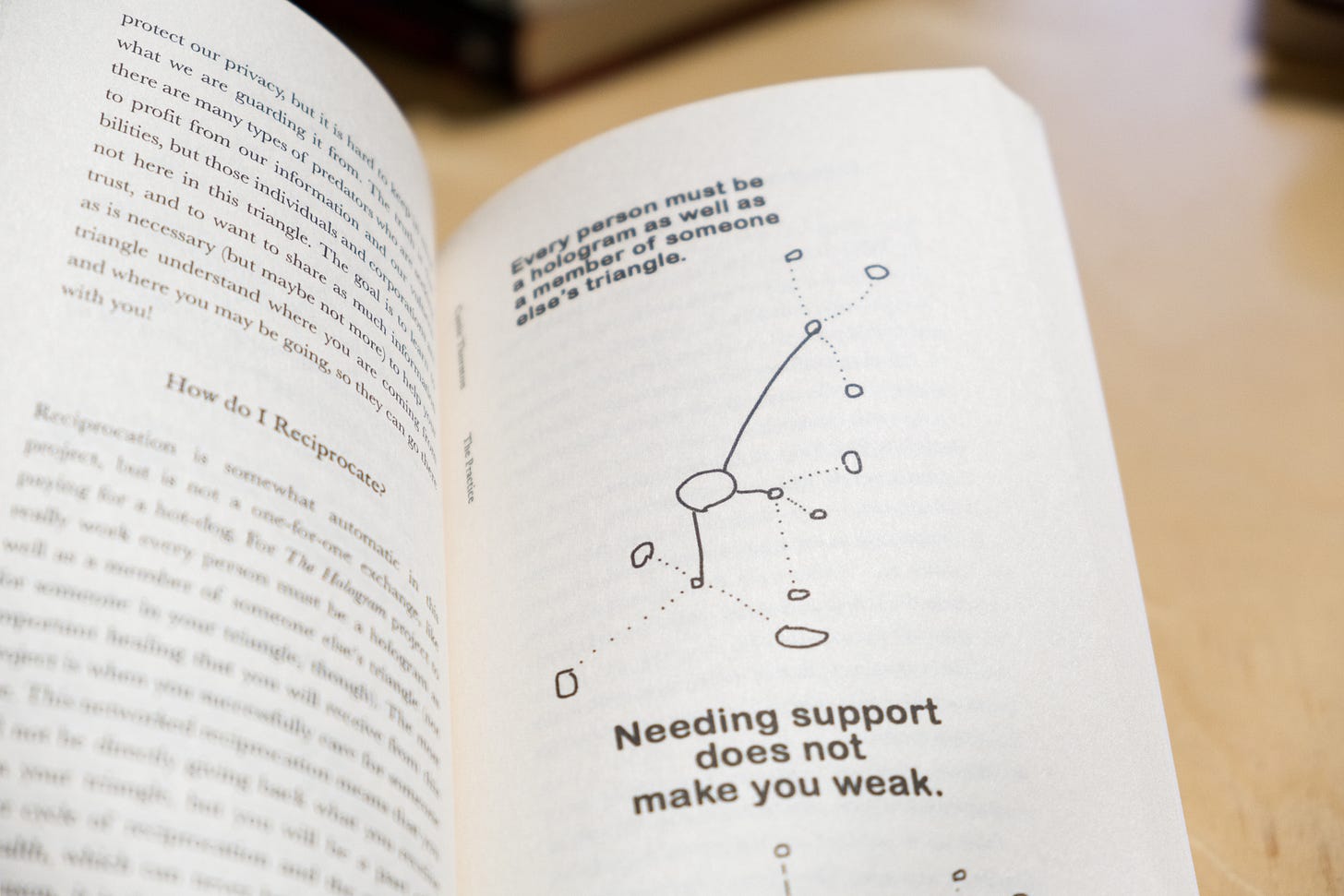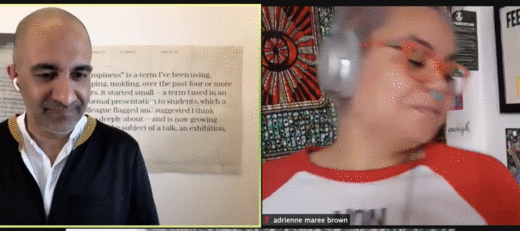”April is the cruellest month, breeding / Lilacs out of the dead land, mixing / Memory and desire, stirring / Dull roots with spring rain.”*
When we look backwards and forwards to events, listenings, readings, and possibilities for communing with octopi, humans, and others alike
Dear dear friends,
What an intense month. At least the seasons are finally starting to shift here in Berlin. And even though we’re still in lockdown, the vaccine seems to be arriving here, slowly. One thing to be hopeful about amidst ongoing challenges.
Yet it’s also a time of new conversations: last week, I had the privilege and pleasure to speak with adrienne maree brown, polymathic creator and NYT bestselling author of Emergent Strategy and Pleasure Activism, who has inspired my thinking and practice for years. Our conversation, which you can watch online, covered a lot of ground: from rituals of loss and transition, personal and creative boundaries, how facilitating and design are not neutral, and ways that joy and emancipation can help imagine a trajectory for Black futures beyond struggle. Plus, adrienne’s choice of closing song, “Unspeakable Joy”, turned out to be ideal for dancing out the week’s woes! Major gratitude to Emily Zimmerman and Laura Mott for organizing this event, and to Jacob Lawrence Gallery, Cranbrook Art Museum, and The Black Embodiments Studio for hosting it.
I’m trying to pace myself better these days, so my last public lecture for a bit will be the keynote for the annual Type Directors Club online conference, “Type Drives Communities” on Friday, 7 May 2021 at 12:00 EDT. This year’s conference features a compelling line-up of speakers thinking about typography across Latin America, Asia, Africa, and beyond. I’ll use the opportunity to dig deep into ideas around bumpiness, complexity, and slowness in a new talk entitled, “On Bumpiness, in Letters”. The two-day gathering is a paid event, but you can use the discount code “FriendofPK” when registering to save on admission.
The coming weeks also mark the start of the new season of Commune /kəˈmjuːn/ Talks, Practicing Entanglement. Organized with a team of design students from Düsseldorf’s Peter Behrens School of Arts, the series of biweekly conversations focuses on mutual support, interdependence, collaboration, and decentralized modes of communing. To kick it off on Wednesday, 12 May 2021 at 19:00 CEST, artist Cassie Thornton will share her feminist, peer-to-peer health project, The Hologram. I think it’s an ambitious and essential project in these precarious times—please pre-register for the event here! Other upcoming speakers include Alice Grandoit-Šutka, editor of the design and social practice journal, deem, on 26 May, and artist, designer, and developer Ritu Ghiya on 9 June. You can already sign up for these talks; we’ll be sharing more details about each event on Instagram soon.

The other class that I’m teaching this semester is called Rituale Gestalten (Designing Rituals), a course in (self-)experimentation with daily protocols and structures. Last week, a brave group of students were the first to lead us all in a grounding exercise, a short presentation on a topic of their choice, and a closing ritual; they focused on binaural beats and their healing effects. Apart from introducing us to an elegant and effective grounding exercise called “54321” (which I’ve now used successfully in a couple of other workshops), they also shared some music for brainwave synchronization, which I’ve been testing out these past days during meditation. It seems to be making some difference in my thinking patterns—I don’t know what yet, but I’ll let you know soon enough.
Last week, I also had adrienne maree brown’s new EP The Sabbatical Suite on repeat—in particular, her haunting track “Toyin”, which transforms tragedy into a moving tribute to life, as well as “Holy Water”, a delicious, nine-minute slow jam with an opening line you want to mouth on infinite repeat: “It’s been a hard day / it’s been a long week / in an endless month / in a fucked up year”. On another register, Triple Canopy just released their new podcast, Medium Rotation. The first episode, “Twenty Thousand Bodies Can’t Be Wrong” begins with Alexander Provan & Nikita Gale posing the question: Why listen? They bring some snark to critiquing how Pauline Oliveros’ term “deep listening” has been coopted by corporate CEOs and self-help gurus, and connect this to issues of race and structural injustice. Whose voice gets to be heard is never neutral. I’m “listening forward” to the rest of the season.
In the spirit of critique, let me mention one of the worst things I’ve encountered recently: the Netflix Original My Octopus Teacher. I find it to be one of the most insipid, un-reflexive, and literally-minded things I’ve wasted time watching—how long can I listen to a middle-aged White guy blithely waxing on about “his” octopus? The only upside is that it gave me a good reminder to return to Peter Godfrey-Smith’s octopus-focused title, Other Minds: The Octopus, the Sea, and the Deep Origins of Consciousness, which had languished for nearly a year in my limbo pile. Reading the book now, I’m reveling in its wide-ranging erudition, handsome interior page design, and surprising insights into evolutionary biology.
Of course, re-starting one book means leaving many others aside. The stacks next to my bed have grown precipitous; my partner seems anxious they’re going to topple over soon. She’s probably right. But before I pack up what’s there, let me just list a handful of the titles I’m partway through that have really grabbed me: Anaïs Duplan’s slim, multilayered Blackspace, which thinks through the possibility of liberation across scales and artistic forms; James C. Scott’s Against the Grain, a rewriting of established ideas around early agrarian states and centralized power; Ruth Kinna’s The Government of No One, a scholarly yet highly readable introduction to the theory and practice of anarchism; Ben Hopkins’ Cathedral, a polyvocal, gripping novel that unpacks the economic and power structures enabling the multigenerational construction of a medieval cathedral; and, last but never, ever least, N.K. Jemisin’s The Stone Sky, the final volume in her Broken Earth trilogy. I cannot put it down. Its potent combination of geological magic, historical subjugation, intergenerational trauma, and revolutionary awakening hits on all the right levels right now. When I referenced the first book of Jemisin’s trilogy in Pompeii!, my recent digital artwork on rituals, destruction, memory, and letting go, I had no idea just how relevant the whole series would turn out to be. Here’s one passage that stays with me:
When I am clean, Kelenli cups my face in her hands. “Do you know the word ‘legacy’?”
I’ve heard it and guessed its meaning from context. … “A legacy is something obsolete, but which you cannot get rid of entirely.”
Take care of yourself and others, wherever you are. I look forward to hearing from you soon.
Hugs,
Prem
*The title of this newsletter quotes the opening four lines of T.S. Eliot’s “The Waste Land” (1922). You can access the whole poem on the website of the Academy of American Poets, which a former self was involved in designing.
P.S. Several people have asked about my “quick chats”. I’ve relished them so much, as they give me the opportunity to meet interesting new folks such as Monika Gruzite or Tamara Stoll. For the moment, though, I have to hit pause—but I encourage you in the meantime to swing by our Commune /kəˈmjuːn/ Talks or other upcoming events, which will surely offer a little time and space for reconnecting!






